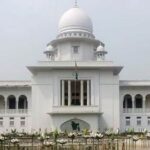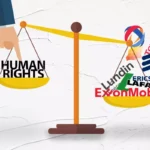On 7 October 2023, Hamas led a surprise attack on Israel, which killed almost 1,200 Israeli citizens and foreign nationals. In response to the attack, Israel launched a severe bombarding campaign and ground invasion in Gaza, which so far killed more than 35,000 Palestinian people, including over 14,000 children and more than 10,000 women, as of the latest death toll on 9 May 2024. Such brutal response from Israel has led Gaza to a severe humanitarian crisis and has raised some legal questions regarding the flagrant violation of human rights and humanitarian law instruments in Gaza, the role of the UN (United Nations) and ICJ (International Court of Justice) in resolving the conflict, and the controversial reactions of Western countries to the war. Dhaka Law Review (DHLR) reached Dr Nakib Muhammad Nasrullah, Professor of International Law, University of Dhaka, with the following questions to know his insights on this ongoing crucial issue.
DHLR: Is the Israeli war against Hamas an act of self-defence which falls under Article 51 of the UN Charter? If so, does that not nullify any proceedings taken by the ICJ?
Professor Nasrullah: No, it does not fall in the strict sense under Article 51 of the Charter. Because the area Hamas controlled has been considered an occupied area by Israel for long. The People of the occupied area always have the right to self-defence. What Hamas did on 7 October, although it violated IHL to some extent, was indeed, an exercise of the right to self-defence. The occupation of a certain territory is tantamount to a continued armed attack over it as it is established by the scholarly opinions of international jurists and academics. It has been stated, even argued by different authors in different articles, that whenever an attack is made by the member of the armed forces and they occupy the territory, then the constant occupation is a constant attack. So, Hamas is always under attack by Israel. The ICJ’s advisory opinion in the popularly known Palestinian Wall cases supports this view. In this case, ICJ termed the Palestinians as the people of occupied territory and thus recognised their entitlement to the right to self-determination. Against this backdrop, the attack by Hamas was a part of their right to self-defence. If out of the way, Israel’s right to self-defence is considered, then it is disproportionate, contrary to the provision of Article 51.
DHLR: On 26 January 2024, the ICJ ordered provisional measures on South Africa versus Israel. We would like to know what would be the legal implications and effects of such provisional measures. And if Israel does not abide by the measures, then what remedies do there lie under international law?
Professor Nasrullah: The provisional measures are usually sought to prevent any emerging dangerous situation before final judgement is given in a case lodged formally with the ICJ. Therefore, the provisional measures have a binding effect until the final judgement is given. In the La Grande case, which was held between Germany and the US, it was established that provisional measures would have a binding effect until any final judgement was given. If Israel does not abide by this order, the complainant party may recourse to the Security Council for undertaking appropriate measures for its enforcement according to Article 94 (2) of the UN Charter. But if it is even violated by that state, then it is up to the Security Council to enforce this judgement or take any action.
But what we see in reality is that no such action has been taken by the Security Council so far. This remains underrated and all the times we see that the violator state enjoys some kind of impunity.
DHLR: Under Article II of the Genocide Convention 1948, intent to destroy a national, ethnical, racial or religious group in whole or in part is necessary to constitute the crime of genocide. How can one establish the “Intent” or “mens rea” of the Israeli Government to commit genocide against the Gazan population?
Professor Nasrullah: Israel’s constant attack on the civilian population in Gaza claiming mostly the death of children and women and its repeatedly non-acceptance of calls for ceasefire from the General Assembly and other global civil societies is a clear proof of its ‘intent to destroy’ the people in Gaza and their next generation who are committed to liberate themselves from the tyranny of Israel. They are killing the children with a view that no more Hamas members can grow in future and thus none remains left to fight against them. This state of mind fulfils the criterion of ‘mens rea as represented by the word ‘intent to destroy’ to constitute genocide according to the Genocide Convention, 1948.
DHLR: Who, if any, is to be held responsible for the unprovoked attack of Hamas on 7 October resulting in the death of 1139 Israelis and another 240 taken hostage?
Professor Nasrullah: Yes, I do agree that Hamas is liable for launching or carrying out an attack on the Civilians. This is a violation of IHL and this is also a violation of the general principles of international law. Had the attack been on Israeli military or military properties, they could remain exempt from international criminal liability.
DHLR: As we know, the West claims itself to be the defender of Human rights. Doesn’t their disregard of the Palestinian plight undermine their claim?
Professor Nasrullah: The West including the US always maintain a ‘biased attitude’ and ‘one-eyed principle’ in favour of Israel disregarding all sovereign rights of the Palestinian people. Such attitude from the West can be traced back to the plot to establish a separate Jewish state in the territory of then Palestine as revealed by the statement of the UK Foreign Secretary Balfour in 1917 and the Resolution of General Assembly(181{11}) in 1947 for partition of the territory of Palestine into two states, one for Arab Palestinians and another for Jewish people leading to an independent Israeli state with Jerusalem placed under a special international regime. Despite the Arab States’ strong opposition to this Resolution, when it was placed for the vote, the Western countries mostly voted in favour. The history never witnessed that the state authorities of the West stood by the Palestinian people strongly. However, the common people of the Western countries have always played diametrically opposite roles and they raise their voices in favour of the Palestinian people, even in the current situation they are organizing road marches, mass gatherings and campaigns with calls for ‘ceasefire’ and ‘stop genocide’. But the state authorities are not responding to their demands.
However, amid this situation the role of South Africa and Brazil, although they are not from the West, is much appreciable. Honestly speaking, although it sounds bad, but hard truth is that to the West and the US, it is not a war between Israel and Palestinian people, it is a war between Jewish and Muslims and they are in favour of Jewish, not Muslims who are undergoing unspeakable humanitarian crisis as a result of irresistible weaponry attack. Protecting Israelis’ rights is a high priority to them over immense violations of human rights of Muslim Peoples and tons of blood so far shed from the killing of children and women by and large the civilians. Some Western jurists also made undesirable comments on Hamas terming them as terrorists such as Marco Sassòli and their sympathy concentrate more on 1400 victims on the first day of attack by Hamas.
DHLR: On 25 March, the UNSC members called for a temporary and immediate ceasefire in Gaza, and the release of hostages taken by Hamas. Do you think this resolution will play an effective role in resolving this conflict?
Professor Nasrullah: Look, the latest decision of the Security Council for ceasefire with abstention of the US from a veto means that it has been approved and thereupon, the UN is requesting Israel to abstain from further attack, but it unfortunately remains unheeded by the Israeli authority. It is not stopping the attack. Now the truth is, this is only the US whose will and proper role can resolve this problem through stopping Israel from further attack. But unfortunately, the US State Department commented falsely that such a resolution of the Security Council is not mandatory as it is not taken under Chapter VII of the UN charter. However in my opinion according to Article 25 of the UN Charter, any resolution taken by the Security Council under the UN Charter to fulfil its objectives is mandatory upon member states.
Here the US abstention to veto the ceasefire, I think, is a kind of eyewash just to show the international community that the US is not in favour of Israel at this time but on the other hand, the US has not stopped supplying the arms and supplying of the arms proves that the US is all over involved in these attacks, directly or indirectly and becomes responsible in the same manner as drawn from the decision in the Nicaragua case.
Above all, the Arab States’ roles so far are much unexpected. They have failed to undertake any effective attempt or convincing endeavour to stop such a situation and even put pressure upon the US authority to abstain from assisting the Israeli authority. The Muslim world has really become very disappointed with the weak role of Arab States.
DHLR: In your opinion why the United States does not recognise Palestine as a state?
Professor Nasrullah: Because, if it becomes a member of the United Nations, then it will have the right, under the UN Charter, to lay a claim on the occupied areas with the consent of other states. The United States knows that most of the Member States are in favour of the Palestinian people. And if they claim the territories which have been occupied by Israel since 1967, Israel would become a much smaller State. That’s probably why the United States is requesting both the parties to come to a mutual settlement regarding the allocation of territory. I assume, this may be the cause of the US veto for its membership. But it is unjustified from the legal point of view about membership according to Article 4 of the UN Charter. Truly speaking Israel has lost its all legal rights under Article 6 of the UN Charter to continue as a member of the UN.
DHLR: What’s your opinion on the legitimacy of the Statehood of Israel?
Professor Nasrullah: Israel, in fact, is an illegitimate State. Over the years, the United Kingdom tried, and failed, to convince the Palestinian Arabs for a Jewish State. When the Palestinian Mandate ended, the United Nations at the request of the UK undertook resolution 181(II), Partition Plan for Palestine. It was undertaken by the General Assembly that there be two States here, one for Palestinian Arabs, and another for the Jews as I told earlier. The division of territories was quite unjustified. When the Arab countries challenged it by bringing the matter before the ICJ, on whether the GA (General Assembly) had the competence to constitute a State through Resolution 181 (II) in 1947, the GA’s attempt was halted sensing the answer might be no, because the GA cannot constitute a state indeed by-passing the satisfaction of the requirements of the statehood as established by the Montevideo Convention, 1933. Under such a situation, David Ben-Gurion, the Zionist leader declared the independence of Israel on the same date the British mandate over Palestine ended. The United States was the first country to recognise its independence. With that, Israel came into being.
The declaration of independence of Israel’s statehood was baseless. There was no legitimate ground for the declaration of its independence according to international law as legitimate as the Jewish people are not under any colonial power, not under an apartheid regime and they were people who took shelter in Palestine; they were not the original people of that land. They came from different European countries. When their efforts for a Jewish State in Europe failed, the Foreign Minister of the UK expressed his desire to establish a Jewish State in Palestine. I therefore always hold my view in academic lectures and public speeches that Israel is not a legitimate state, but rather the outcome of the Western plot of settling the Jewish state for their political interest to disturb peace and tranquillity in the Muslim-dominated Middle-Eastern countries.
DHLR: Recently, South Africa has made an application before the ICJ concerning Israel’s violation of the Genocide Convention. Do you think Bangladesh can play any role in helping the Palestinians without affecting its own interests?
Professor Nasrullah: South Africa brought the allegation according to Article 9 of the Genocide Convention to the ICJ against Israel about its commission of genocide in the Gaza Strip in December 2023 with a request to issue an order of provisional measures to stop genocide and accordingly ICJ issued a provisional order on 24 January 2024. The provisional order was not that satisfactory as it was not an order to stop the military campaign over Gaza, rather it ordered Israel to prevent those activities which seem to be genocide. Not only Bangladesh but every state party to the Convention is empowered under Article 9 of the same to bring such an allegation on any cause of action if it comes true according to the said Article. But it depends upon the desire of Bangladesh. When we see a country like Gambia and their endeavour against the Myanmar Military Regime at the event of ethnic cleansing there, resulting in the issuance of provisional order by the ICJ, no point in disbelieving, being the closest neighbour sheltering about a million refugees could do so. Even now, if Bangladesh attempts to undertake any endeavour in favour of the People in Gaza, it must receive support from the international community.
It is very upsetting that the Muslim countries are often seen as politically strategic, confined to protecting their economic interests and others, and therefore fail to take any brave measure to protect the interests of people of their same faith even with the call for the cause of humanity.
DHLR: Thank you so much sir for giving us your valuable time.
Professor Nasrullah: Thank you.












